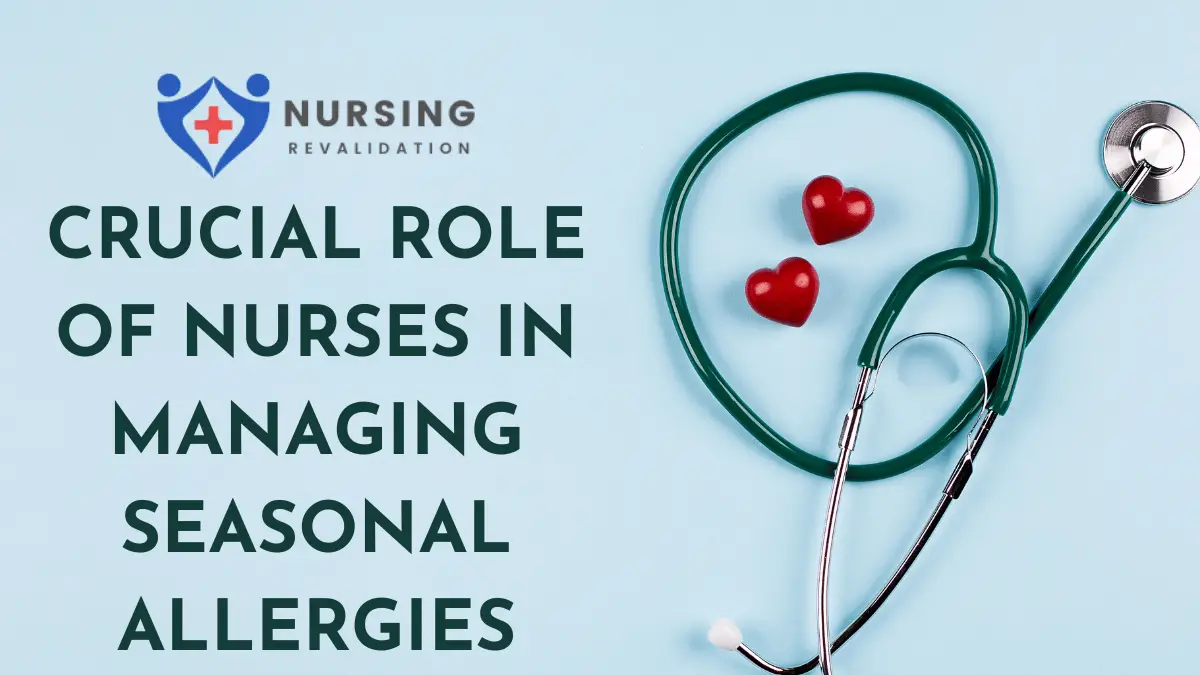In the realm of healthcare, nurses stand at the forefront, playing a pivotal role in patient care and management. When it comes to seasonal allergies, their significance amplifies. Seasonal allergies, also known as allergic rhinitis or hay fever, affect millions worldwide, causing discomfort and disrupting daily life activities. In this comprehensive guide, we delve into the indispensable role nurses play in managing seasonal allergies, offering insights, strategies, and evidence-based practices to alleviate symptoms and improve patient outcomes.
Understanding Seasonal Allergies: A Primer
Before diving into the role of nurses, it’s crucial to grasp the basics of seasonal allergies. Allergic rhinitis typically occurs in response to airborne allergens such as pollen, mold spores, dust mites, and pet dander. When these allergens enter the body, the immune system overreacts, triggering a cascade of inflammatory responses that result in bothersome symptoms like sneezing, nasal congestion, itching, and watery eyes.
Table: Common Seasonal Allergy Triggers
| Allergen | Common Sources |
|---|---|
| Pollen | Trees, grasses, weeds |
| Mold Spores | Damp indoor environments, outdoor foliage |
| Dust Mites | Bedding, upholstered furniture |
| Pet Dander | Cats, dogs, other furry animals |
Identifying Triggers and Risk Factors
One of the primary responsibilities of nurses in managing seasonal allergies is identifying potential triggers and risk factors. Through thorough patient assessment and history-taking, nurses can pinpoint specific allergens that exacerbate symptoms. Common triggers vary depending on geographic location, seasonal changes, and individual sensitivities. By recognizing these triggers, nurses can educate patients on avoidance strategies and lifestyle modifications to minimize exposure.
Diagnostic Tools and Techniques
Nurses are adept at utilizing diagnostic tools and techniques to confirm seasonal allergies accurately. From skin prick tests to blood tests measuring specific IgE antibodies, nurses play a vital role in facilitating allergy testing and interpretation of results. These assessments not only confirm allergic triggers but also guide treatment decisions, ensuring personalized care for each patient.
Patient Education and Empowerment
Empowering patients through education is a cornerstone of nursing practice, particularly in managing chronic conditions like seasonal allergies. Nurses provide comprehensive education on allergy prevention, symptom management, medication adherence, and environmental control measures. By equipping patients with knowledge and self-management skills, nurses enable them to take an active role in their care and achieve better health outcomes.
Collaborative Care and Interdisciplinary Approach
In the continuum of allergy management, collaboration is key. Nurses work collaboratively with allergists, immunologists, primary care physicians, and other healthcare professionals to deliver holistic care to patients. Through interdisciplinary teamwork, nurses ensure coordinated care, seamless communication, and shared decision-making, ultimately enhancing patient satisfaction and treatment efficacy.
Pharmacological Interventions and Symptom Management
Pharmacological interventions play a crucial role in alleviating seasonal allergy symptoms and improving quality of life. Nurses are responsible for administering medications, monitoring therapeutic responses, and educating patients on proper usage and potential side effects. From antihistamines and nasal corticosteroids to decongestants and leukotriene modifiers, nurses guide patients in selecting the most appropriate treatment modalities based on individual needs and preferences.
Non-Pharmacological Approaches and Lifestyle Modifications
In addition to pharmacotherapy, nurses advocate for non-pharmacological approaches and lifestyle modifications to complement allergy management. These may include allergen avoidance measures, such as using air purifiers, minimizing outdoor activities during high pollen seasons, and implementing allergen-proof bedding. Furthermore, nurses promote nasal saline irrigation, steam inhalation, and other adjunctive therapies to alleviate nasal congestion and enhance mucociliary clearance.
Promoting Allergy Awareness and Community Engagement
Beyond the clinical setting, nurses play a vital role in promoting allergy awareness and community engagement. Through public health initiatives, educational seminars, and outreach programs, nurses raise awareness about seasonal allergies, allergen avoidance strategies, and the importance of early intervention. By fostering a culture of allergy awareness and advocacy, nurses contribute to healthier communities and improved population health outcomes.
Conclusion
In conclusion, nurses are indispensable allies in the management of seasonal allergies, offering expertise, empathy, and holistic care to patients. From identifying triggers and conducting diagnostic assessments to providing patient education and advocating for community health, nurses play a multifaceted role in allergy management. By harnessing their knowledge, skills, and compassion, nurses empower patients to effectively manage their allergies and lead healthier, more fulfilling lives.

